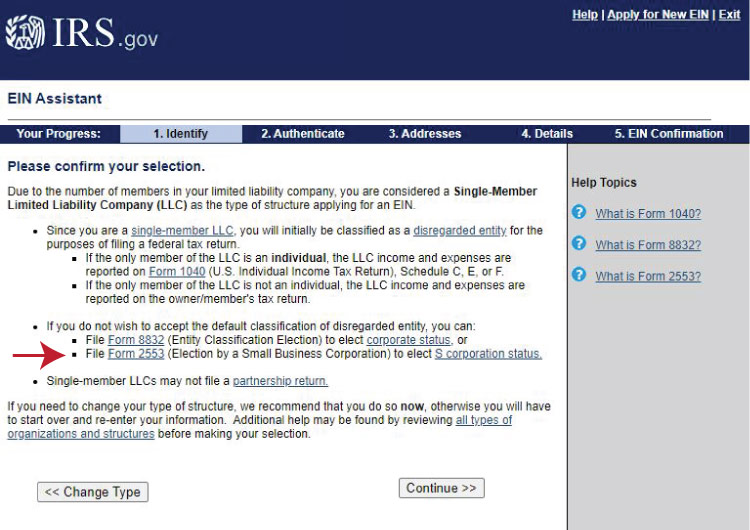How to Start an S Corp in Pennsylvania
Starting an S corporation (S corp) in Pennsylvania can lead to tax savings if it’s the right fit for your business.
This guide will take you through the steps required to form an S corp in Pennsylvania and help you decide if it’s the best option for you.
Read on to get started and see how a Pennsylvania S corp could reduce your taxes.
Pro Tip: Get a free consultation with a tax professional to determine if an S corp is right for you.

Factors to Consider Before Starting an S Corp in Pennsylvania
Before forming an S corp, you have to consider the following factors:
- Is an S corporation the best strategy for your business?
- S corporation restrictions
- Why a limited liability company (LLC) is the best structure for S corp tax status
- Are S corp tax advantages right for you?
Is an S Corporation the Best Strategy for Your Business?
For help with choosing the right structure for your business, visit our Choosing a Business Structure guide.
S Corporation Restrictions
S corps have several restrictions, such as being limited to one class of stock and 100 shareholders. Read our What Is an S Corporation guide for full details.
Are S Corp Tax Advantages Right for You?
An S corporation is a tax designation that can be elected by an LLC or corporation. With an S corp, business owners are considered employees of the company and must receive a reasonable salary. Since all S corps technically have employees, the s corp must run payroll.
In order to benefit from a Pennsylvania S corp tax designation, your business needs to make enough money to offset payroll expenses. Furthermore, S corps are beneficial for business owners who take large distributions in addition to their salary.
To learn more about the tax advantages of an S corp, read our LLC vs. S corp guide and take a look at our S Corp tax calculator.
Pro Tip: Get a free consultation with a tax professional to determine if an S corp is right for you.
How to Form a Pennsylvania S Corp
There are two main ways to start an S corp:
- By forming an LLC and electing S corp tax status from the IRS when you request your employee identification number (EIN)
- By forming a corporation and electing S corp status from the IRS
We recommend forming an LLC because it’s simpler and more cost-effective.
Not in Pennsylvania? Check out our other How to Start an S Corp guides to learn more.
Recommended: If you have an existing LLC, visit our How to Convert an LLC to S Corp guide.
Steps for Forming an LLC and Electing S Corp Status in Pennsylvania
Starting a Pennsylvania LLC and electing S corp tax status is easy. You can use our guides to start an LLC with the S corp status yourself, or you can hire a service provider like Northwest to guide you through this process.
There are five basic steps to start an LLC and elect S corp status:
Step 1: Name Your LLC
Step 2: Choose a Registered Agent
Step 3: File the Certificate of Organization
Step 4: Create an Operating Agreement
Step 5: Get an EIN and File Form 2553 to Elect S Corp Tax Status
Step 1: Name Your LLC
Choosing a company name is the first and most important step in starting your LLC in Pennsylvania.
Be sure to choose a name that complies with Pennsylvania naming requirements and is easily searchable by potential clients.
1. Follow the naming guidelines for a Pennsylvania LLC:
- Your name must include “company,” “limited,” or “limited liability company;” an abbreviation of one of those terms; or words or abbreviations with the same meaning.
- Your name cannot include any words implying that it is a business corporation, such as “corporation” or “incorporated” or an abbreviation of these terms.
- Your name cannot include words that could confuse your LLC with a government agency (FBI, Treasury, State Department, etc.).
- You may need approval from the Bureau of Professional and Occupational Affairs, the Department of Education, the Department of Banking and Securities, the Insurance Department, or the Public Utility Commission to include certain restricted words.
- Your name must be distinguishable from any existing business in the state. This includes Pennsylvania reserved names.
You can also read the Pennsylvania state statute about LLC naming guidelines for more information.
2. Is the name available in Pennsylvania? Make sure the name you want is available by doing a business entity search on the Pennsylvania Department of State website.
3. Is the URL available? We recommend checking to see if your business name is available as a web domain. Even if you don’t plan to create a business website today, you may want to buy the URL in order to prevent others from acquiring it.
Step 2: Choose Your Pennsylvania Registered Agent
You must choose a registered office, also known as a registered agent, for your Pennsylvania LLC.
An LLC registered agent will accept legal documents and tax notices on your LLC’s behalf. You will list your registered agent when you file your LLC’s Certificate of Organization.
Many business owners choose to hire a registered agent service. Many of these services will form your LLC for a small fee and include the first year of registered agent services for free.
Step 3: File the Pennsylvania LLC Certificate of Organization
The Pennsylvania Certificate of Organization is used to officially register an LLC.
File Your Pennsylvania Certificate of Organization
OPTION 1: File Online With Pennsylvania Business One-Stop Shop
File Online– OR –
OPTION 2: File by Mail or in Person
Download FormState Filing Cost: $125, payable to the Commonwealth of Pennsylvania (Nonrefundable)
Mailing Address:
Pennsylvania Department of State
Bureau of Corporations and Charitable Organizations
P.O. Box 8722
Harrisburg, PA 17105
Office Address:
Department of State
401 North St., 206 North Office Building
Harrisburg, PA 17120
Note: A Docketing Statement must be included when filing a Certificate of Organization.
Step 4: Create an LLC Operating Agreement
An LLC operating agreement is a legal document that outlines the ownership and member duties of your LLC.
For more information, read our LLC Operating Agreement guide.
Our operating agreement tool is a free resource for business owners.
Step 5: Get an EIN and Complete Form 2553 on the IRS Website
An EIN is a number that is used by the US Internal Revenue Service (IRS) to identify and tax businesses. It is essentially a Social Security number for a business.
EINs are free when you apply directly with the IRS.
Elect S Corp Tax Status
During the online EIN application, the IRS will provide a link to Form 2553, the Election By a Small Business form.
Visit our Form 2553 Instructions guide for detailed help with completing the form.
This is the form to elect S corp tax status for your LLC:

Ready to start saving on your taxes?
We recommend using a formation service to start your Pennsylvania S corp for you, so you can focus on the things that matter most — growing your business.
Keep Your Pennsylvania S Corp Compliant
Starting your Pennsylvania S corp is an exciting step, but staying compliant with state and federal regulations is essential to keep your business in good standing. Here’s a guide to maintaining compliance for your Pennsylvania S corp.
File the BOI Report
All S corporations — whether LLCs or corporations — must file a Beneficial Ownership Information (BOI) report with the Financial Crimes Enforcement Network (FinCEN). This report helps the federal government maintain accurate records of who owns or controls your business, ensuring compliance and transparency.
You can file the BOI report through the FinCEN website.
Open a Business Bank Account
Maintaining a clear separation between your business and personal finances is critical for protecting your LLC’s liability status. A dedicated business bank account will help you manage business finances effectively and ensure compliance with both state and federal regulations.
Explore the best banking options for your business in our guide on the Best Banks for Small Business.
Obtain Necessary Business Licenses and Permits
Pennsylvania S corps must secure the appropriate licenses and permits based on the business’s industry and location. Compliance with local, city, and state licensing requirements is important to legally operate your business.
To determine which licenses and permits you need, refer to our Pennsylvania Business License guide.
Register for State Taxes
Some Pennsylvania businesses are required to register for state taxes with the Pennsylvania Department of Revenue. This registration covers taxes like sales tax, use tax, and employer withholding taxes. Proper registration ensures compliance with state tax laws and helps avoid penalties.
You can learn more at the Pennsylvania Online Business Tax Registration page.
File Your Annual Report
Pennsylvania requires LLCs to file an Annual Report with the Pennsylvania Department of State. This report updates the state with the current information about your business, such as the name and address of your registered agent. The Annual Report is due by Sept 30. Failing to file can lead to administrative dissolution.
You can file your Annual Report online at the Pennsylvania Department of State’s website.
Understand Pennsylvania’s S Corp Tax Obligations
Pennsylvania S corps are subject to state income tax and other applicable taxes, such as sales and use taxes for certain businesses. Additionally, your business must comply with federal tax obligations, including filing IRS Form 1120-S. Understanding these tax requirements is essential to maintaining compliance.
For more information about state taxes, visit the Pennsylvania Department of Revenue.
Start a Pennsylvania S Corp FAQ
An S corporation (S corp) is a tax designation that an LLC or a corporation can elect.
No. The default taxes for an LLC and taxes for an S corp are not the same.
With an S corp, owners pay personal income tax and self-employment tax on a predetermined salary. They may then withdraw any remaining profits from the business as a “distribution,” which isn’t subject to self-employment tax.
With an LLC, all company profits pass through to the owners’ personal tax returns, and then the owners must pay personal income tax and self-employment tax on the entire amount.
S corp owners are required to earn a “reasonable” salary, which basically means a fair market rate based on the individual’s qualifications as well as their duties and responsibilities at the company. The purpose of this requirement is to prevent S corp owners from paying themselves an artificially low salary in order to pay less self-employment tax.
A distribution is a dividend that a shareholder/owner can take from the business profits that remain after a company pays all of its employee salaries. Shareholders must pay personal income tax on distributions, but distributions aren’t subject to self-employment tax.
LLCs and corporations that operate under a “doing business as” (DBA) name can choose the S corp election.
You can form a business and elect S corp status for it within a range of major industries in Pennsylvania. Whether you launch a business in the manufacturing, energy, scientific, medical, or technology sectors — or start a small retail shop or restaurant – the S corp tax designation can help you save money come tax season.
With its low income tax rate, affordable cost of living, and many business incentives and credits, Pennsylvania is an attractive location for entrepreneurs looking to save money on their tax bills by starting an S corp.